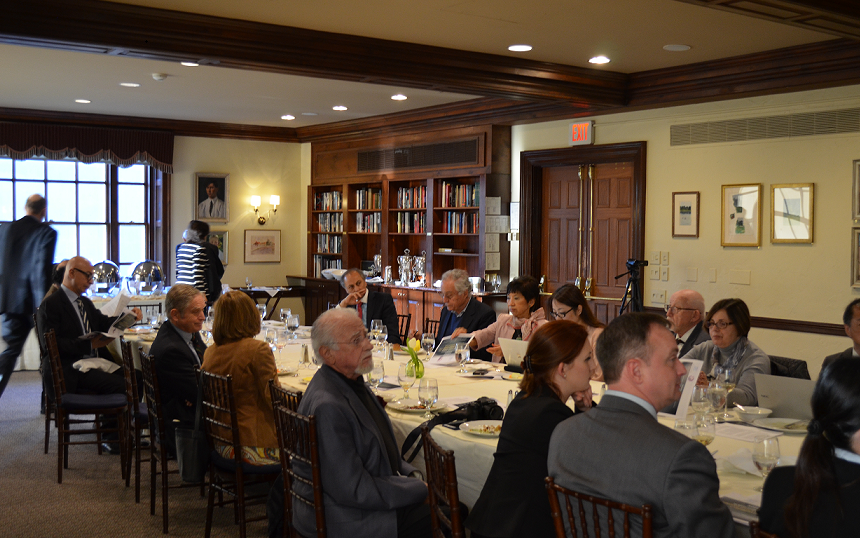The Boston Global Forum (BGF) held its BGF-G7 Summit Initiative Conference on Monday, May 9, at the Harvard University Faculty Club, in Cambridge, Mass., with prominent experts, and leaders from around the world, in person and online, discussing topics to be taken up at the G7 Summit on May 26-27 in Japan. The BGF has been working with Japanese officials to craft proposals to submit for consideration by the national leaders.

Readers may hear and see the conference by clicking on this link.
Much of the conference was taken up by the focus of this year’s BGF-G7 Summit Initiative – “Building Ethics Norms for Cyberbehavior’’. To advance this cause, BGF experts have crafted its “Ethics Code of Conduct for Cyber Peace and Security,’’ which has been informed by, among other things, a series of online dialogues in the past few months about cybersecurity and other issues to be taken up by the leaders at the summit.
The second part of the conference included discussions about other themes at the summit, especially Japanese concerns about aggressive actions by North Korea and China.
The BGF was honored by the participation of Inada Tomomi – a high official in Japan’s ruling Liberal Democratic Party who could become that nation’s first woman prime minister.
We were also honored that another participant, Tsutomu (“Tommy”) Himeno, the Japanese consul general for New England, lauded The Boston Global Forum for its work in the BGF-G7 Summit Initiative, which he sees as very useful in preparing the leaders’ agenda for May 26-27.
Gov. Michael Dukakis, moderator of the conference and BGF chairman and co-founder, presented to Consul Himeno the documents containing the final recommendations of the BGF-G7 Summit Initiative Committee. Mr. Himeno has forwarded them to the summit planners.
Among the remarks by speakers at the BGF-G7 Summit Initiative conference:
Governor Dukakis: “No country is without sin’’ when it comes to cybersecurity violations.
Prof. Jose Barroso, former President of the European Commission; former Prime Minister of Portugal and Member of The BGF-G7 Summit Committee, said that growing cybersecurity threats called for “binding agreements based on international law.’’ He added that other important matters to be taken up by the G7 Summit include “lack of investment confidence,’’ as well as “Muslim terrorism,’’ the refugee crisis and the related war in Syria and Russian attacks on Ukraine.
John Savage, An Wang Professor of Computer Science, Brown University, and Member of The BGF-G7 Summit Committee:
Three key (and interwoven) topics at the summit are “the global economy; trade and investment, and improving infrastructure.’’ All are profoundly affected by cybersecurity and the lack thereof. This further heightens the need for the public and private sectors to adopt and obey international cybersecurity norms to protect economic growth.
Prof. Derek Reveron, Professor of National Security Affairs and the EMC Informationist Chair at the U.S. Naval War College and Member of The BGF-G7 Summit Committee: “Citizens feel struck in the middle’’ of growing cyberinsecurity and interwoven “political, economic and social challenges,’’ of which one big player is transnational criminal gangs. And, he noted, the discovery of government roles in cybersecurity violations “undermines public confidence’’. The public, he said, wants and needs cyberbehavior norms in order to feel more secure as they go about their lives.
Ryan Maness, Research Fellow in Security and Resilience Studies, Northeastern University, and Member, The BGF-G7 Summit Initiative Committee: “Many fear that we’re experiencing a dangerous breakout trend’’ and that “cyberwars’’ are underway but things aren’t that bad yet. Further, better “cyberhygiene’’ (common-sense practices – e.g., more careful password protection, etc.) would prevent many problems.
Tomomi Inada, Chairman of the Policy Research Council of Japan’s Liberal Democratic Party and Member, Japanese House of Representatives, said that the security environment to be discussed at the summit is worsening because of {in addition to North Korean threats} Chinese expansionism in the East and South China Seas and China’s rapid military buildup; its military budget, she said, is now “3.6 times’’ Japan’s. But Japan, in collaboration with the United States, is “expanding its deterrent force’’ in the Asia/Pacific region. She noted the importance of cybersecurity in Japan’s “national risk assessment’’ as “the threat of cyberattacks is increasing around the world.’’
“We need the rule of law in cyberbehavior,’’ she emphasized.
Speakers at the conference included:
Gov. Michael Dukakis.
Prof. Joseph S. Nye Jr., Member of Board of Thinkers, Harvard University Distinguished Service Professor; Member of Board of Thinkers, the Boston Global Forum.
Prof. Jose Barroso.
Prof. Stephen M. Walt, Belfer Professor of International Affairs, International Security Program, Belfer Center for Science and International Affairs, Harvard University.
Prof. Ezra Vogel, Henry Ford II Professor of the Social Sciences Emeritus, Harvard University.
Prof. Nazli Choucri, Professor of Political Science, MIT; Director of the Global System for Sustainable Development (GSSD), Member of The BGF-G7 Summit Committee.
Prof. John Savage.
Prof. Derek Reveron.
Prof. Chris Demchak, RADM Grace M. Hopper Chair of Cybersecurity in the Strategic Research Center for Cyber Conflict Studies, U.S. Naval War College.
Tsutomu Himeno, Japanese Consul General, Boston; Member of The BGF-G7 Summit Committee.
Prof. Eisuke Sakakibara (“Mr. Yen’’), Former Japanese Vice Minister of Finance.
Tomomi Inada.
Ambassador Ichiro Fujisaki, President of the America-Japan Society; Professor at Sophia University and Keio University; Former Japanese
Ambassador to the U.S.; Member of The BGF-G7 Summit Committee.
Ambassador Shunji Yanai, Former Japanese Ambassador to the U.S.
Prof. Koichi Hamada, Special Adviser to Japanese Prime Minister Shinzo Abe.
Prof. Fumiaki Kubo, Graduate Schools for Law and Politics, University of Tokyo.
Prof. Matthew Smith, Computer Science Professor at the Rheinische Friedrich-Wilhelms-Universität, Bonn.
Prof. Ryan Maness.
Greg Palmer, Director of Azure Infrastructure and Cybersecurity for Microsoft in New England.
Allan Cytryn, Senior Information Technology Executive, Risk Masters Inc.; Member of the BGF-G7 Summit Committee.
Margarita Levin Jaitner, Research Fellow, Blavatnik Interdisciplinary Cyber Research Center (ICRC).